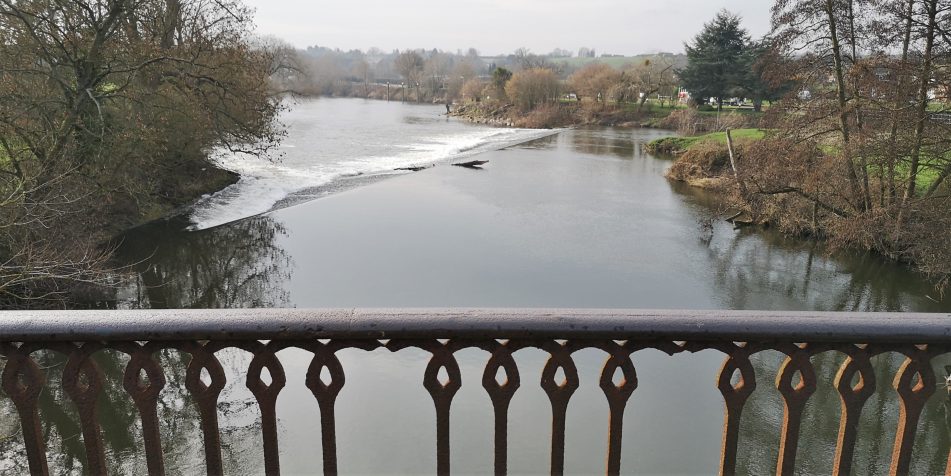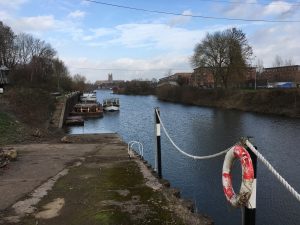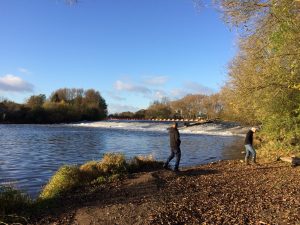
Work has commenced on a fish pass on the east bank of the River Severn alongside Bevere Weir. A 100m bypass-channel will allow twaite shad to swim upriver towards their natural spawning grounds, going past Bevere for the first time in more than 170 years. Other rare and endangered fish species such as salmon and eel will also benefit, finding it much easier to move up and down the river past the weir. In fact, re-establishing native fish species has important positive effects for a wide range of wildlife throughout the whole river ecosystem.
The by-pass channel we are installing in Bevere is different to the other fish passes that we will be building along the River Severn, that take the form of a ‘ladder’ with each rung, stepping up a level. In contrast, the by-pass channel at Bevere is like a long, gently sloping ramp. Blocks are cast into the base of the channel to break up the flow of water and create the conditions that shad need to comfortably swim up the channel.
To start work at Bevere, we first need to provide contractors access to the site of the new fish pass. We are currently building a temporary road so that site traffic and machinery can get into position alongside the river ready to start the fish pass.
Footpath closures
The site access road to the fish pass at Bevere starts from Hawford Lock Lane (near to the junction with the A449). It tracks across 3 fields towards the river before turning down the footpath (507B) which goes does down a wooded bank, and then heading downstream alongside the riverside (footpath 502B) to the works next to Bevere Weir. To ensure the safety of the public, both of these footpaths and footpath 501(C) will unfortunately need to be closed whilst the new fish pass is being built. The alternative route uses the public footpaths linking Bevere village to the river and a short section of Bevere Lane.
We are about to construct the access track near to the public footpaths. This will involve moving heavy machinery and in the interests of public safety, we will soon have to put the footpath closures in place.
Download a map of footpaths affected and alternatives routes
Archaeology
We have carried out detailed archaeological surveys in the field where the fish pass will be installed and also in one of the fields where the access track is being installed. From satellite/areal photographs, there was evidence of Roman features in this field, so we made careful excavations along the way. The archaeologists did confirm a Roman ditch, probably part of a stock enclosure.
Looking Ahead
We expect the access work to be finished towards the end of June, and then the first phase of construction can begin. Steel sheet piles will be installed along the boundary of the fish pass. Once the steel piles are in place, the river bank material will be excavated, and the material then removed from site.
Replanting for Wildlife
Looking ahead to completion of the fish pass, due spring 2020, we have developed plans for a sensitive replanting that will maximise the opportunities for native wildlife and increase biodiversity in this riverside environment. We have selected plants that will thrive here and provide a boost to wildlife.
The final landscape plan has been developed in consultation with Worcestershire County Council and the Environment Agency. The new riverbank alongside the fish pass will be sown with wetland meadow grasses and wild flowers to provide nectar and pollen for bees, butterflies, dragon and damsel flies. The edge of the fish pass will be planted with a two metre wide strip of Phragmites providing nesting sites for the rare reed warbler whose nest is often used by the cuckoo.
Other elements include a new pond layout with its margins planted with a variety of native flowers and the rare Black Popular will also be planted in the boggy conditions adjacent to the pond. Alongside the wooded path on the approach to the river, a new understorey of hazel, field maple, wayfaring tree and dog rose will be created on both sides.
Unlocking the Severn represents a once-in-a lifetime opportunity to protect the long-term survival of rare species and make the river more ecologically vibrant.
We look forward to sharing opportunities to connect with the amazing natural heritage of the River Severn as this project progresses.


